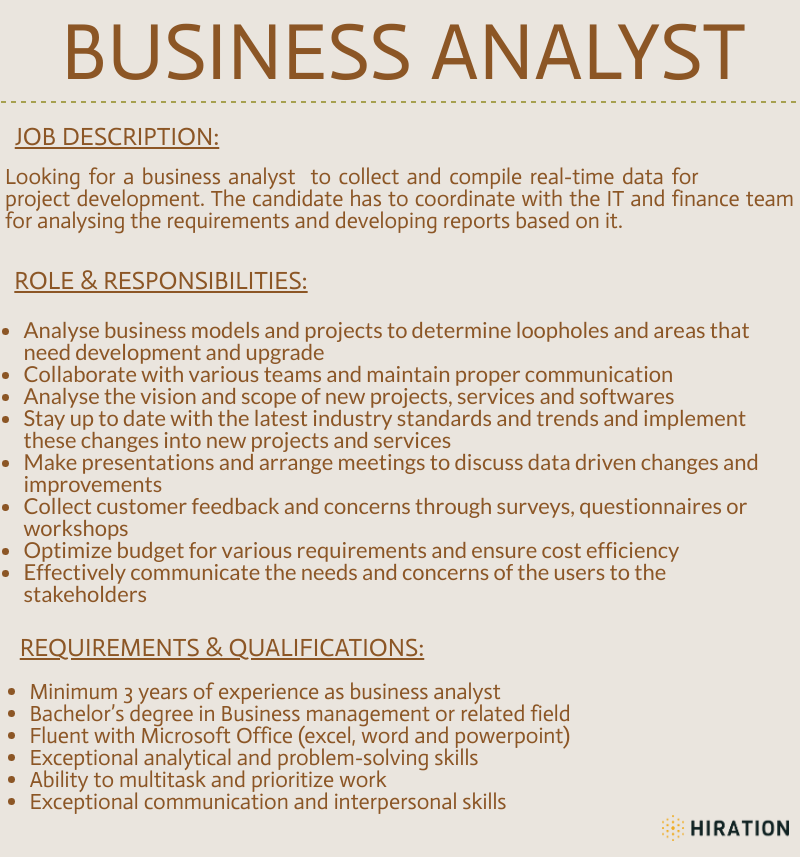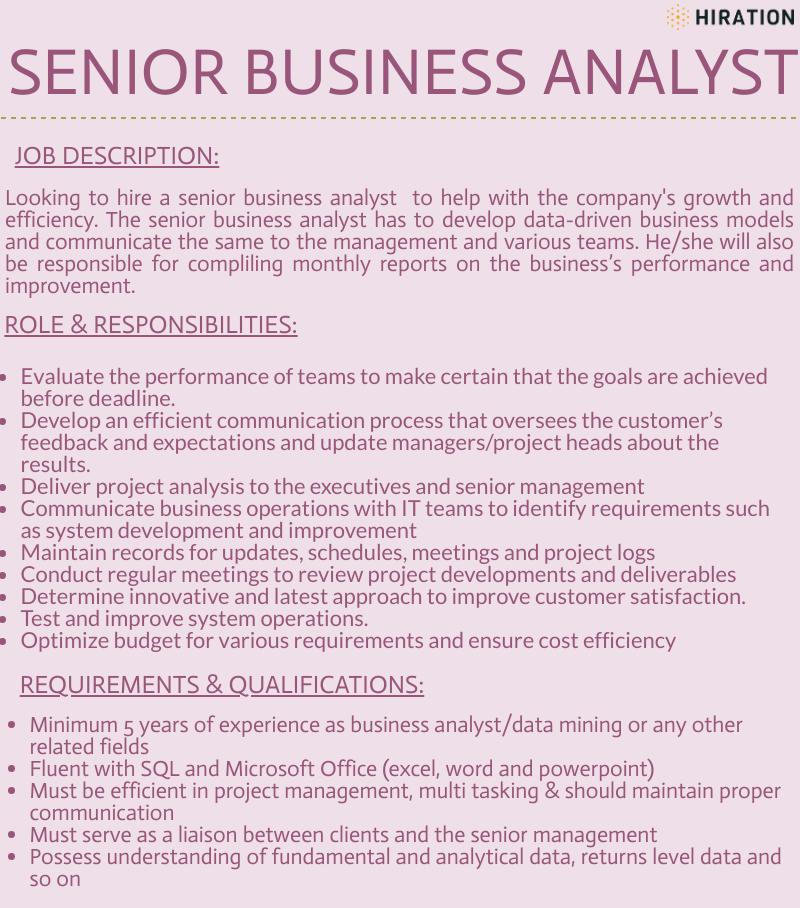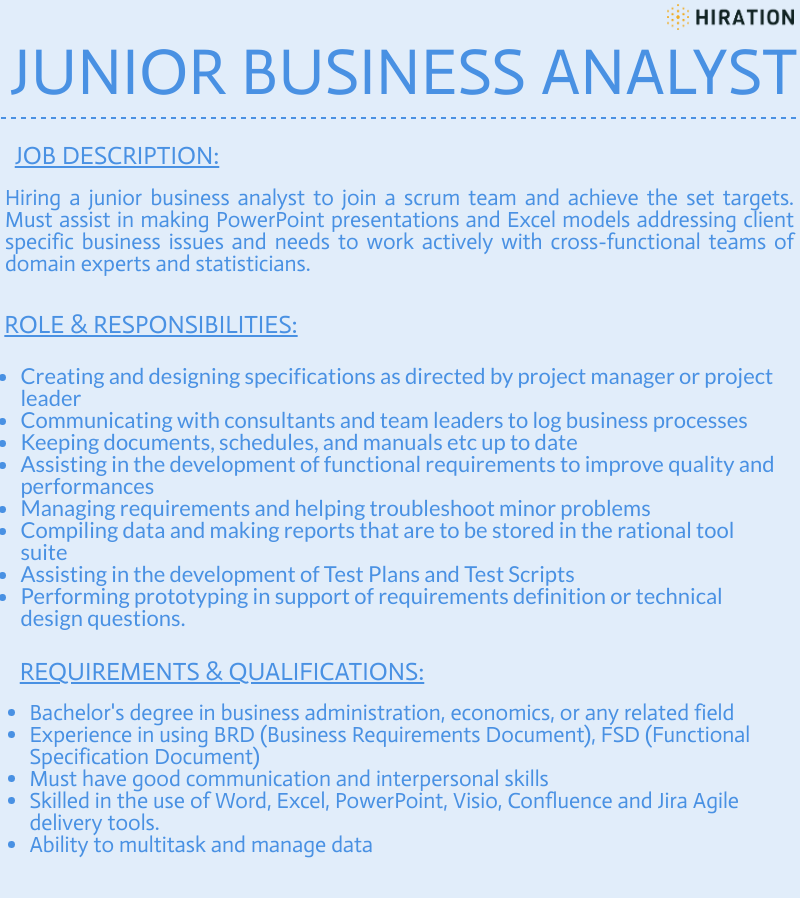What does a business analyst do, and what skills are required?
A business analyst turns needs into requirements, analyzes data, and partners across teams to propose cost-effective improvements and support agile delivery. Key skills: communication, analysis, SQL, data management; a bachelor's degree is typical.
“Evolve or dissolve”
As businesses race to surpass the bar of success set by their competitors, having a stagnant business model is like setting up the business for failure ahead of time.
For businesses to flourish and grow, evolution and adaptation according to the changing times and its needs are of utmost importance.
Of course, business models or projects cannot be changed or altered based on guesswork or trial work.
Companies need solid data and real-time evidence to base their development and growth.
So how do businesses adapt to the changing needs of the market? Who procures the data required for the necessary implementation of change?
Yes, they need a certain somebody called a business analyst to procure data from IT, build or modify business models/projects, procedures, services, software, etc and present these to the executives or the CEOs of the companies for their approval and feedback.
This is what business analysts do and the reason why they are important to any business.
A typical business analyst job description can look like this:

Now, in this blog you will also find the following information related to the business analyst job description:
- What does a business analyst do?
- How much does a business analyst make?
- What is a senior business analyst job description?
- What is a junior business analyst job description?
- What are the business analyst skills you need to possess?
- What are the qualifications to be a business analyst?
- What are the most popular business analysis tools and software?
Business Analyst Roles and Responsibilities
As a business analyst, there are quite a few responsibilities that entail this position.
Besides having to analyze, identify and troubleshoot minor to major issues in business models, projects, or software, depending upon the industry you’re in, the position also calls for having great communication and analytical skills.
To get a clearer perspective of a business analyst’s role, take a look at the different responsibilities of this position in two backgrounds:
IT Business Analyst Job Description
IT business analysts are responsible for identifying and troubleshooting issues related to the IT department.
The solutions and changes that they suggest must be cost-efficient and feasible for the company to achieve.
Day to day responsibilities of an IT business analyst includes:
- Identifying and resolving IT project complications
- Analyzing compounded business issues and determining a technical solution
- Gathering data based on user needs and satisfaction
- Recommending hardware and software updates to support the client's business objectives
- Defining goals and scope of software for certain business systems
- Working closely with project head or managers or end-users to determine the best IT solution
- Evaluating, testing, and recommending new procedures for enhancing software, hardware, and IT operations
- Compiling and distributing reports on application development
- Designing and executing A/B testing course of action to draw out data from test runs
- Communicating with the IT and the executive team about the latest technologies and their usage
Agile Business Analyst Job Description
Agile business analysts are agents of change who work closely with team leaders and managers to apply agile methodologies such as Scrum, Kanban, and XP.
Agile business analyst roles and responsibilities comprise of the following:
- Providing excellent analytical solutions for the stakeholders
- Collaborating with product owners to create product backlog using agile practices thereby increasing the business worth
- Delivering user stories to various teams
- Holding up agile practices and encouraging the advancement of services and products
- Enabling different agile processes like backlog refinement, daily stand-up, sprint review, retrospective, iteration or release planning, and so on
- Generating low or high-fidelity frameworks accordingly
- Ensuring proper communication between the clients, technical team, and product owner so that there are no loopholes
- Preparing documents together with design flow and wireframes.
Business Analyst Salary
The salary of a business analyst will depend on factors such as location, experience, and the industry.
Some states in the US like San Francisco and New York pay a lot higher compared to other states like Atlanta and Georgia.
With that being said, the average salary of a business analyst is roughly about $59,500 per annum, according to PayScale.com.
Take a look at the following table for industry-based salaries of business analysts:

Senior Business Analyst Job Description
As the title of this position suggests, a senior business analyst is someone who has a good amount of experience in the field and therefore has more expertise and responsibilities.
A senior business analyst is responsible for assessing the business procedures, services, etc of a company or a client to strategize and facilitate business growth and efficiency.
They also help the companies to execute business strategies so that their goals are accomplished on time and under the stipulated budget.

Junior Business Analyst Job Description
A junior business analyst usually works as a part of a scrum team or assists a senior business analyst to complete tasks and achieve desired goals.
Their roles and responsibilities are not as demanding as that of a senior business analyst given their level of experience and expertise.
Here’s a sample of a junior business analyst job description:

9 Must-have Skills to Become a Business Analyst
To get hired and excel as a business analyst, certain skills are extremely necessary for carrying out the duties that come with this role.
Check out these 9 business analyst skills you need to possess:
- Excellent communication and analytical skills
- Data management
- Interpersonal and liaison skills
- Expert understanding of SQL and database management systems
- Familiarity with Agile methodologies
- Commercial and general awareness of latest systems and trends
- Documentation and report preparation
- Knowledge of system development methodologies such as JAD/RAD sessions, use case, and process flow diagrams
- Time and budget management
Qualifications and Certifications to Become a Business Analyst
To start a career as a business analyst, the minimum requirement is a bachelor’s degree, preferably in business administration or any related field.
Apart from that, it’s always great to have extra certifications that help you hone your skills as a business analyst.
Although being certified is not mandatory, it can definitely boost your chances of getting hired.
For someone who doesn’t have prior work experience as a business analyst, consider getting certified by taking certificate courses like:
- IIBA Entry Certificate in Business Analysis (ECBA)
- IIBA Certification of Competency in Business Analysis (CCBA)
- IIBA Certified Business Analysis Professional (CBAP)
- IIBA Agile Analysis Certification (AAC)
- IQBBA Certified Foundation Level Business Analyst (CFLBA)
- IREB Certified Professional for Requirements Engineering (CPRE)
- PMI Professional in Business Analysis (PBA)
Popular Business Analyst Tools & Software
To excel as a business analyst, there are certain tools and software that are incredibly helpful for people working as a BA.
Business analysis tools and software help BAs to have a smooth flow of communication, collaboration, collection and storage of data, and so on.
They need a reliable way to document the business requirements and manage workflow with ease.
There are an array of business analyst tools and software available for the same purpose.
Using any one or a combination of a few of the following tools and software can help improve employee productivity and efficiency:
| SAS Business Analytics (SAS BA) | Pencil |
| Board | Balsamiq |
| Sisense | Microstrategy |
| KNIME | Trello |
| TIBCO Spotfire | Tableau Big Data Analytics |
Now that you have a proper understanding of a business analyst job description, and everything that entails this role, get ready to send out your resume and prepare for interviews.
Key-points from the Blog
- Business analysts are agents of change who help formulate business models, procedures and software by identifying areas for improvement
- BAs help project leaders and managers to apply agile methodologies
- BAs work and collaborate with different teams from the same organization
- They serve as a liaison between customers/clients and stakeholders
- Creating prototypes, doing test runs, documenting and collecting data are some of the general responsibilities of a business analyst
- Great communication and analytical skills are must-haves for anyone aspiring to be a business analyst
- Time and budget management are two of many other responsibilities of a senior business analyst
- Aspiring BAs in the IT industry need to be familiar with using Business Requirements Documents (BRD), Functional Specification Document (FSD) and Structured Query Language (SQL)
- Bachelor’s degree in business administration or any other related field is the minimum education qualification required to be a business analyst
- BAs need to use certain tools and software to ensure a smooth workflow and proper communication
Go to Hiration resume builder and create a professional resume for yourself. Additionally, reach out to us at support@hiration.com and you can get 24/7 professional assistance with all your job & career-related queries.
Frequently Asked Questions
-
What does a business analyst do?
You procure data from IT, build or modify business models, procedures, services, and software, and present these to executives or CEOs for approval and feedback. You help businesses adapt using solid data and real-time evidence.
-
What are the key responsibilities of an IT business analyst?
You identify and resolve IT project complications, analyze compounded business issues and determine a technical solution, and gather data based on user needs and satisfaction.
-
What does an Agile business analyst do?
You work closely with team leaders and managers to apply agile methodologies such as Scrum, Kanban, and XP. You enable processes like backlog refinement, daily stand-up, sprint review, retrospective, and iteration or release planning.
-
How much does a business analyst make?
The average salary of a business analyst is roughly about $59,500 per annum, according to PayScale.com. Actual pay depends on factors such as location, experience, and the industry.
-
What is a senior business analyst job description?
You assess business procedures and services to strategize and facilitate business growth and efficiency. You also help companies execute business strategies so goals are accomplished on time and under the stipulated budget.
-
What is a junior business analyst job description?
You usually work as a part of a scrum team or assist a senior business analyst to complete tasks and achieve desired goals. Your roles and responsibilities are not as demanding as that of a senior business analyst.
-
What skills do you need to become a business analyst?
Core business analyst skills include Excellent communication and analytical skills, Data management, Interpersonal and liaison skills, and Familiarity with Agile methodologies.
-
What qualifications do you need to become a business analyst?
You need a bachelor’s degree, preferably in business administration or any related field. Certification is not mandatory, but options like IIBA Entry Certificate in Business Analysis (ECBA) can boost your chances of getting hired.
-
What tools and software do business analysts use?
Examples include SAS Business Analytics (SAS BA), Trello, and Tableau Big Data Analytics. These tools help communication, collaboration, collection and storage of data.
-
How does a senior business analyst differ from a junior business analyst?
A senior business analyst has more expertise and responsibilities and assesses procedures and services to facilitate growth and efficiency. A junior business analyst usually works as part of a scrum team or assists a senior to achieve goals.



